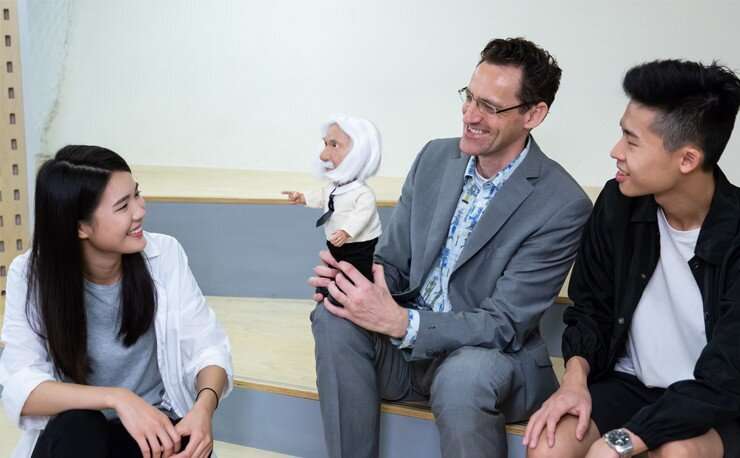July 25, 2023 feature
This article has been reviewed according to Science X's editorial process and policies. Editors have highlighted the following attributes while ensuring the content's credibility:
fact-checked
trusted source
proofread
Exploring the use of robots to guide loving-kindness and walking meditation practices

Meditation practices can often positively influence the lives of practitioners, for instance, improving their emotional well-being, reducing stress levels and increasing their focus on daily activities. While some meditators practice in silence without any external guidance or cues, many use audio recordings and smartphone applications, or attend sessions led by meditation teachers.
Researchers at the Hong Kong Polytechnic University and Hong Kong Science Park recently explored the potential value of robots as guides for two different types of meditation practices: loving-kindness and walking meditations. Their findings, published in the International Journal of Human-Computer Studies, suggest that the unique characteristics of social robots can impact their effectiveness as assistants during meditation.
"Our recent paper explores the potential use of social robots to maintain or enhance young adults' mental well-being, especially following the stress and isolation arising from the COVID-19 pandemic," Ivy Shiming Huang, one of the researchers who carried out the study, told Medical Xpress. "We aimed to address mental-health care avoidance by proposing robot-guided interventions, specifically loving-kindness and walking meditations, that can be conveniently practiced at home."
Huang and her colleagues specifically explored the use of robots as guides for loving-kindness meditation and walking meditations. Loving-kindness meditation is designed to promote empathy and feelings of openness towards others, by prompting those meditating to mentally send kindness and good wishes to others, starting from close friends or relatives and moving on to acquaintances and even complete strangers.
On the other hand, as suggested by its name, walking meditation is designed to make individuals more mindful of what they are experiencing while walking, an action that is generally performed mindlessly and automatically. When practices regularly, both loving-kindness and walking meditations can enhance creativity, reducing negative emotions and fostering an openness toward new experiences.
"Our work was inspired by the Broaden-and-Build Theory, emphasizing the role of positive emotions in well-being, and also by the work of Richards, who proposed that everyday creativity bolsters and reflects psychological health," Huang explained. "We hoped to further explore how social robots can be customized for mental health interventions targeting young adults."
To assess the potential of social robots as assistants for loving-kindness and walking meditation, Huang and her colleagues carried out experiments involving 142 participants aged between 18 and 34. These participants completed meditation sessions, either guided by the recorded voice of a meditation teacher or by a social robot. In their robot-assisted trials, the researchers specifically used NAO, a humanoid social robot developed by Aldebaran Robotics, a French company that was later acquired by the SoftBank group.

"The participants were divided into groups; some received audio guidance, others were guided by the robot, and a control group simply rested," Huang said. "We conducted surveys both before and after a 10-minute session to measure the effects. Our goal was to determine whether robot-guided meditations, compared to audio-guided ones, were more effective in evoking openness and positive feelings, thereby leading to increased creativity and improved mental health."
The researchers analyzed their study participants' survey responses, which summarized their perceptions and emotions before and after completing the different meditation sessions, guided by audio recordings or the robot. They found that both the loving-kindness and walking meditation sessions stimulated positive emotions and feelings of openness, irrespective of whether they were guided by an audio tape or the NAO robot.
"The loving-kindness meditation led to a positive change in valence as well, meaning that it fostered more pleasant emotions," Huang said. "We discovered a positive correlation between emotional valence and openness, both of which were associated with an increased willingness to create. Our findings suggest that when young adults experience positive emotional valence, they are likely to demonstrate improved performance in convergent thinking that needed in daily creative activity, which could potentially lead to a decrease in negative moods."
While both the audio recording-based and robot-guided meditation sessions appeared to have some beneficial effects on the participants' mood and their openness, participants appeared to prefer the former. This suggests that the robot-guided meditation was not as effective.
"The synthetic voice used in our study for the robot-guided groups may not have facilitated the same level of positive experience as a human voice," Huang said. "Additionally, a robot's appearance resembling a yoga guru could raise expectations that, if not met, lead to disappointment. Moving forward, we plan to explore the characteristics of the robot's physical and vocal features on its intervention effect."
Overall, the findings gathered by the researchers confirm that guided loving-kindness and walking meditation practices can make meditators feel like they are more open to others or to their experiences. This highlights their potential benefits for facilitating creative processes or easing feelings of social isolation.
As the sessions led by the NAO robot did not appear to be as effective as those guided by a recorded human voice, the team is now planning to further investigate factors that might have reduced their efficacy. In their next studies, they will change some of the robot's delivery, such as its voice, tone, movements, and so on, to determine whether these could impact the perceptions and feelings of meditators.
"It's our aim to not only improve young adults' psychological well-being through the use of social robots, but also to make significant contributions to this emerging field," Huang added. "We recognize the necessity of studying the impact of social robots across different populations and acknowledge the current lack of guidance on designing robot-based interventions for mental health.
"Our goal is to develop a deeper understanding of how social robots can promote participation in at-home interventions and provide evidence-based support for young adults' mental health. We will thus continue exploring the efficacy and potential benefits of using social robots in mental health interventions for young adults."
More information: Ivy S. Huang et al, Loving-kindness and walking meditation with a robot: Countering negative mood by stimulating creativity, International Journal of Human-Computer Studies (2023). DOI: 10.1016/j.ijhcs.2023.103107
© 2023 Science X Network


















